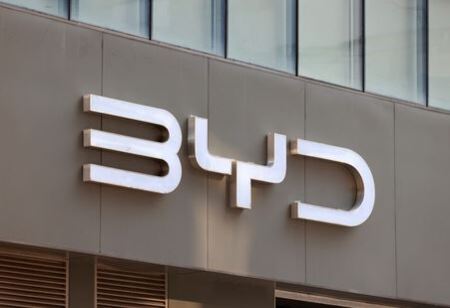
BYD Slows Production, Delays Capacity Expansion at China Factories


By cutting shifts at several Chinese plants and postponing plans to build new production lines, Chinese electric car leader BYD has slowed its rate of production and expansion in recent months.
The actions are a warning that BYD's strong sales growth over the last two years, which helped it surpass Tesla (TSLA) as the largest EV manufacturer in the world, may slow down as it struggles with growing inventory despite implementing significant price reductions in China's fiercely competitive car industry.
According to reports, who asked not to be identified since the topic is confidential, BYD has eliminated night shifts and cut output by at least a third of the capacity at several of its factories.
At least four plants were subject to these hitherto undisclosed procedures, and BYD has also halted some of its plans to install new production lines.
With at least seven auto facilities in China, BYD sold 4.27 million cars last year, primarily in that nation.
This year, the company hopes to increase sales by nearly 30 percent to 5.5 million.
In April and May, BYD's output growth fell to 13% and 0.2% year-over-year, respectively, according to data from the China Association of Automobile Manufacturers. These slowdowns were the slowest since February 2024, when a week-long lunar New Year vacation interrupted factory operations.
Also Read: Auto Guangzhou 2023: Cars, Vehicle Tech Steering the Automobile Race
The data indicated that beginning in the second quarter of 2023 and 2024, BYD increased its monthly output. However, this year's pattern has shifted, with average output in April and May being 29 percent lower than in 2024's fourth quarter.
By rapidly expanding production and accelerating the release of new, more inexpensive models, BYD has become the largest EV manufacturer in the world in a matter of years.
A wider selloff in Chinese car stocks and new price reductions from competitors were brought on by its latest price incentives, which lowered the starting price of its cheapest model to 55,800 yuan ($7,800).
BYD dealers had the largest average inventory of any brand in China, with an average of 3.21 months, according to a May poll by the China Automotive Dealer Association. The industry average was 1.38 months.
In the eastern province of Shandong, a major BYD dealer has gone out of business, according to government-owned media last month, with at least 20 of its stores discovered to be closed or abandoned.
Also Read: China Sports Green Empowered Asian Games in Hangzhou
In early June, the China Auto Dealers Chamber of Commerce urged automakers to set "reasonable" production targets based on sales success and to cease offloading too many cars on dealerships as inventory levels rise. According to the group, fierce price battles were putting pressure on cash flow and lowering profitability.
In an effort to ease financial strains, Chinese auto dealers encouraged automakers on Monday to pay cashback incentives within 30 days.
As the years-long practice has put pressure on suppliers, manufacturers, and dealers throughout the industry, Chinese regulators have recently increased their monitoring of the auto sector due to deepening pricing competition.
In an effort to boost sales and counteract the waning momentum in their domestic market, Chinese automakers are now aggressively searching for foreign markets.
Approximately 20 percent of BYD's 1.76 million vehicles sold in the first five months of this year were exported.

